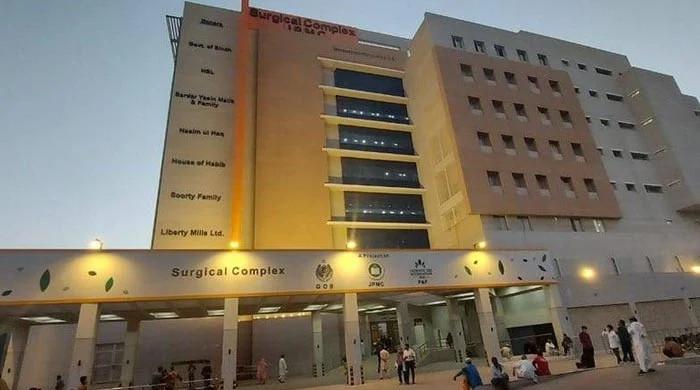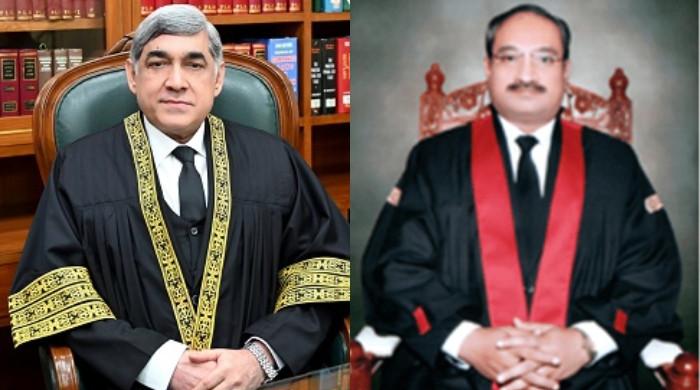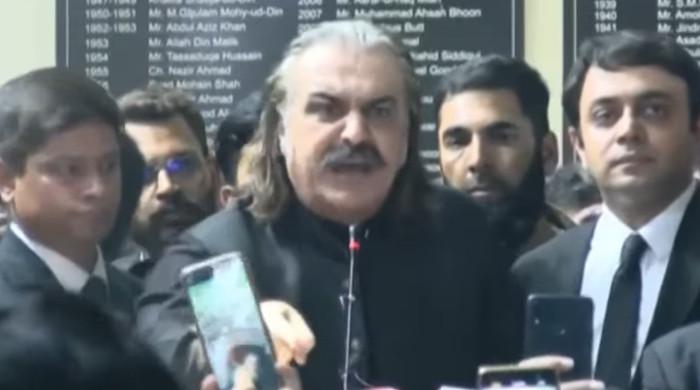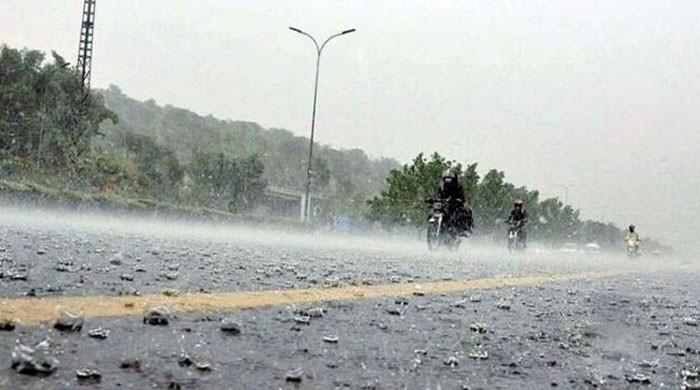Govt not doing anything about interference in judicial matters: SC judge
CJP during hearing says it was surprising none of the lawyers were on same page for judiciary's independence
May 07, 2024
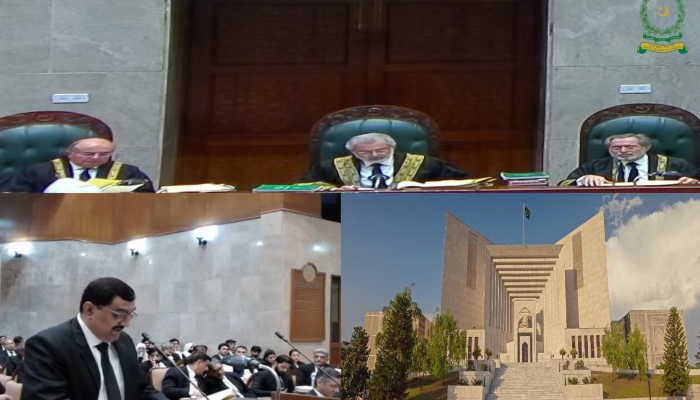
ISLAMABAD: Supreme Court of Pakistan's Justice Jamal Khan Mandokhail on Tuesday said that the government was not doing anything regarding the alleged interference in judicial matters.
Justice Mandokhail made these remarks as a six-member bench of the top court, headed by Chief Justice of Pakistan (CJP) Qazi Faez Isa, resumed the suo motu hearing on the Islamabad High Court (IHC) judges' letter accusing agencies meddling in judicial matters.
The bench also comprises Justice Syed Mansoor Ali Shah, Justice Jamal Khan Mandokhel, Justice Athar Minallah, Justice Musarrat Hilali and Justice Naeem Akhtar Afghan.
On March 25, six judges of IHC had demanded CJP Isa to convene a judicial convention to consider the matter of alleged interference of intelligence operatives in the judicial functions or "intimidation" of judges in a manner that undermined the independence of the judiciary.
The six IHC judges — Justice Mohsin Akhtar Kayani, Justice Babar Sattar, Justice Arbab Muhammad Tahir, Justice Tariq Mahmood Jehangiri, Justice Sardar Ejaz Ishaq Khan and Justice Saman Rifat Imtiaz — had written a letter to the chief justice, who is also chairman of the Supreme Judicial Council (SJC).
Seeking guidance from the council on “interference” of the spy agencies in courts’ affairs, the judges wrote: "We are writing to seek guidance from the Supreme Judicial Council (SJC) with regard to the duty of a judge to report and respond to actions on part of members of the executive, including operatives of intelligence agencies, that seek to interfere with discharge of his/her official functions and qualify as intimidation, as well as the duty to report any such actions that come to his/her attention in relation to colleagues and/or members of the courts that the High Court supervises."
Subsequently, the Supreme Court on April 1 took suo motu notice of the IHC judges' letter and formed a seven-member bench led by CJP Isa to hear the matter.
Today's hearing
Today, Attorney General for Pakistan (AGP) Mansoor Awan appeared before the court. Meawhile, Riazat Ali appeared as the Pakistan Bar Council’s (PBC’s) lawyer while Khawaja Ahmed Husain was present on behalf of Aitzaz Ahsan.
At the outset of the hearing, AGP Awan apprised the court that written order of the last hearing is not yet received.
The AGP said that the order must be shown to the prime minister to file government's reply. He added that the government would be able to file its response by tomorrow if they receive the order today.
The Supreme Court Bar Association also submitted suggestions to the top court, saying that it would never compromise on the independence of the judiciary.
The SCBA called for an inquiry against those who intervene in the judicial matters. It said that the IHC has the power of contempt of court and it should have taken contempt of court action for any kind of interference.
The CJP then asked the AGP to read the written order.
Islamabad High Court Bar Association's lawyers then came to the rostrum to present his arguments.
Lahore, Balochistan High Court Bar and Balochistan Bar Council lawyer's Hamid Khan also appeared in court.
The CJP said that it was surprising that none of the lawyers were on the same page for the independence of the judiciary.
PBC's lawyer then began his arguments by reading the letter in the court.
He said that the judges have sought guidance from the Supreme Judicial Council. The PBC representative said that the judges have made very serious allegations.
Justice Minallah said that the note says the government should satisfy the court and not interfere in judicial matters.
PBC lawyer said that the body should form a judicial commission comprising Supreme Court judges. He added that all the allegations should be probed.
He further said that the top court, under Article 184/3 of the Constitution, cannot investigate itself.
Justice Minallah said everyone was agreeing that there is interference in judicial matters.
At this, Justice Mandokhail said that there is interference but the government is not doing anything about it.
CJP Isa then said that Supreme Judicial Council is a separate body and the Supreme Court cannot give directions to it. "I am the chairman of the Supreme Judicial Council but I am not the SJC itself. There are other members in the body," he said.
Justice Minallah remarked that this is not a letter but it reflects a trend, adding that the AGP said this happened in 2018 as well.
Pakistan Bar Council's (PBC) lawyer said that the government was not doing anything, hence, the judiciary itself has to take action.
CJP Isa then summarised that the PBC was suggesting a probe, that the judges use criminal laws to deal with the issue and launch contempt of court proceedings.
At this point, Justice Mandokhail said that there should be a deterrence that if anyone tries to interfere then they would suffer.
SCBA President Shahzad Shaukat said that there can be no compromise on the independence of the judiciary, adding that the judiciary should make decisions without any pressure.
"Those who interfere in judicial matters should be punished," stressed Shaukat, adding that the high court can develop its own method to stop interference in judicial matters.
Shaukat said that the judges should limit their social circle, adding that if there is pressure from a fellow judge or colleague, a complaint should be made to CJP Isa.
He said that if the chief justice is unable to resolve the complain, then the person should go the SJC. "Trolling of any judge should not be allowed," he further highlighted.






